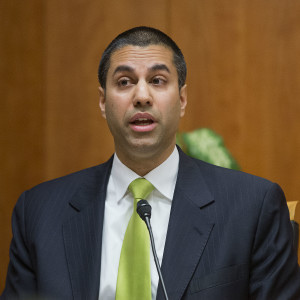A Federal Communications commissioner is doubling down on arguments against the agency’s recent Open Internet Order, saying the agency failed to “identify a single” net neutrality abuse before adopting new regulations over broadband providers earlier this year.
“The commission ominously warned that ‘[t]hreats to Internet openness remain today,’ that broadband providers ‘hold all the tools necessary to deceive consumers, degrade content or disfavor the content that they don’t like,’ and that the FCC continues ‘to hear concerns about other broadband provider practices involving blocking or degrading third-party applications,'” FCC Commissioner Ajit Pai told the Bill of Rights Institute’s Kansas Public Lecture late Thursday.
“The only problem with all of this: none of it is true.”
Pai, one of two Republicans on the five-member commission who have found themselves in the minority on regulatory policy, described the net neutrality rules as “a solution in search of a problem,” adopted via a highly politicized process originating inside the White House. Pai first made those criticisms in February after Chairman Tom Wheeler unveiled the plan to lump broadband providers with telephone servicers under Title II of the 1996 Telecommunications Act.
Pai said the legislation, passed by a then-Republican Congress and signed by then-President Bill Clinton, was drafted to “preserve the vibrant and competitive free market that presently exists for the Internet” and remain “unfettered by Federal or State regulation,” in the bill’s own words.
Wheeler’s plan, while primarily intended to ban Internet service providers from blocking, throttling or charging more to prioritize Web traffic, also inherently gives the agency the power to regulate the rates providers charge edge providers (Netflix, Amazon, YouTube, etc.) and consumers for service — power that Pai and others assert will drive down network investment over regulatory uncertainty associated with the rules.
“The difficulty with the FCC’s regulations isn’t just their breadth,” Pai said. “They’re also vague.”
Pai pointed to the order’s “Internet conduct” standard, which gives the FCC the authority to rule on whether certain business practices providers engage in are permissible. When asked what kind of conduct that entailed, Wheeler responded, “we don’t really know.”
“Instead of providing any specific guidance, he analogized the FCC to a football referee and said that it would throw the flag if it saw behavior that it didn’t like,” Pai said. “That answer, I would submit, is the very definition of regulatory uncertainty.”
The next week Wheeler said regulating the Internet as a public utility common carrier service is “no more regulating the Internet than the First Amendment regulates free speech in our country.”
“Now, I give him credit for trying to couch the FCC’s decision as being consistent with our nation’s founding principles, but it shows a very different take on our Constitution,” Pai said. “The First Amendment is one of our most cherished principles because it operates as a restraint on government. It lets ideas compete in the marketplace free from any government intervention or regulation.”
“It quite clearly has nothing in common with the FCC’s decision to subject the Internet to extensive government control,” he added.
Pai was first asked about net neutrality’s potential impact on online free speech earlier this year.
“It is conceivable to me to see the government saying, ‘We think the Drudge Report is having a disproportionate effect on our political discourse,” Pai told the Right Online conference in May. “’He doesn’t have to file anything with the FEC. The FCC doesn’t have the ability to regulate anything he says, and we want to start tamping down on websites like that.’”
Pai told InsideSources he doesn’t see a direct correlation between Title II and free speech, but rather thinks the government’s regulatory expansion over the Internet’s infrastructure represents a broader, disturbing trend that could conceivably extend to Internet content.
“There are a lot of people who just don’t like the fact that the Internet is a completely unregulated marketplace in terms of the freedom of speech,” Pai told InsideSources. “And there are some speech that people just don’t like or they think that it should be regulated because it has an outsized effect on public discourse, and the Drudge Report is one of those.”
Pai partnered with Federal Election Commissioner Lee Goodman earlier this year to call attention to a similar proposal recently brought before the FEC, and net neutrality’s potential to impact it (Lee also spoke at length with InsideSources about the issue.)
“You often hear people grousing about that fact that newspaper editors and TV reporters and journalists get their lead from what they see on the front page of Drudge, and accordingly, Drudge should be given special scrutiny,” Pai said.
“That’s all fine for the private sector to debate, but I think when it comes time for the government to take a look at this, that’s when my antenna will go up,” he continued, “because obviously from a First Amendment perspective, that’s not something I want to see.”
Despite the fervor the FCC’s order has raised since its passage in February, Pai doesn’t believe it’ll withstand future regulatory, legislative or judicial scrutiny (the rules have already been challenged in the D.C. Court of Appeals, where the broadband industry and FCC will face off over the legality of the regulations next month).
RELATED: FCC’s Pai: Net Neutrality Court Challenge ‘A Complete Crapshoot’
“There are many avenues for rolling back the agency’s rules,” Pai said. “They could be vacated by a court. They could be reversed by Congress. Or they could be overturned by a future FCC.”
“About nine months later, I am still optimistic that these regulations’ days are numbered.”

